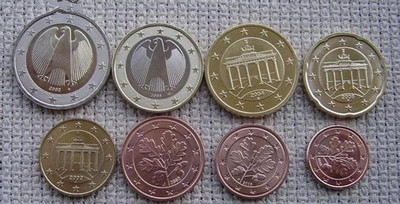德國和歐元
You Kant do that
請依法辦事
Many Germans fear that the European Central Bank is not on their side
很多德國人擔心歐洲央行不是他們這一陣營的
HORST SEEHOFER, premier of Bavaria, sums up German attitudes to the European Central Bank (ECB). Based in Frankfurt, but run by Mario Draghi, an Italian, the ECB said on September 4th that it would cut its interest rate to 0.05% and start buying asset-backed securities from banks to get them to lend. By opening the money tap, taking on debt and buying “junk”, Mr Seehofer told Bild, Germany's biggest tabloid, the ECB frightens people. “It must be our job to criticise these policies.”
巴伐利亞州州長霍斯特·澤霍費爾向歐洲央行(ECB)表明了德國的態度。坐落于法蘭克福,但如今卻被意大利人馬里奧·德拉基掌舵的ECB,在9月4日公開表示,將基準利率下調至0.05%并從放貸銀行購買資產抵押債券。澤霍費爾向圖片報透露,ECB借著開通資金流、承擔債務和購入“低檔債券”的方式來恐嚇民眾。他表示“我們的職責就是批評這些政策。”

Like others on the centre-right, Mr Seehofer frets that a new anti-euro party, the Alternative for Germany, will poach voters by bashing the ECB. The Alternative has just got into its first state parliament and may get into two more on September 14th. But scepticism about the ECB is growing across the country. Hans-Werner Sinn, boss of Munich's Ifo Institute and an economist, echoes Mr Seehofer: the ECB has “cut interest rates by too much”; and it is not authorised to buy bonds “as this is a fiscal and not a monetary-policy measure. Such a policy would be at the expense of European taxpayers, who would have to pay for the losses incurred by the ECB.”
與其他中右翼黨派一樣,澤霍費爾同樣憂心德國新選擇黨—一個新的反歐元黨派—會借機抨擊ECB來拉攏選民。而新選擇黨才剛剛成功進入第一個州議會,在9月14日新選項黨還可能會成功進入另外兩個。但是ECB質疑論正在這個城市大肆傳播。慕尼黑經濟研究所所長漢斯-維爾納·辛恩也在澤霍費爾之后隨聲附和:ECB已經“降低基準利率太多”;而且ECB并未得到購買債券的授權,因為這并不是一個貨幣政策措施而是一個財政法令。而這樣的一個政策將以歐洲的納稅人為代價,讓他們不得不為ECB引起的損失買單。
Mainstream views in Germany are diverging from those elsewhere in the euro zone and in Anglo-Saxon countries. The world outside Germany is afraid of deflation. Germans, however, worry that cheap money could lead eventually to inflation. This may be surprising, since prices in the euro zone are rising by only 0.3% a year, far below the ECB's 2% target. But inflation fears have been etched into the German psyche since the hyperinflation of 1922-23.
現今德國國內的主流觀點便是與那些歐元區的其他國家和盎格魯-撒克遜國家分道揚鑣。除德國之外,全世界都懼怕通貨緊縮。然而,德國人憂心的卻是寬松貨幣政策最終可能引發通貨膨脹。由于歐元區的價格一直在不斷上漲,每年漲幅僅為0.3%,這相較于ECB2%的目標已經是很低了,在這種狀況下,德國人的此種擔憂讓人頗感意外。但是自從經歷過1922-1923年的惡性通貨膨脹之后,德國人對通貨膨脹的恐懼已經深入骨髓。
Many are cross that cheap money is crushing interest rates on savings accounts and capital life-insurance policies, a common form of retirement planning. Real returns on such savings are laughable, just when greying Germans need them. Low rates may boost shares and property, but ordinary Germans shun such assets. One argument they use against low rates, indeed, is that they create asset bubbles.
也有許多人持相反的觀點,他們認為寬松貨幣政策正壓制儲蓄賬戶和資本人壽保險政策的基準利率。這種儲蓄的實際回報效果卻讓人覺得可笑,僅僅是在頭發花白的德國人需要之時才會出現。低利率可能會刺激股票和房地產行業,但是普通的德國人還是會避開這兩樣資產。而實際上這些普通人用來反對低利率的一種說法便是,這樣做會引起資產泡沫。
But the roots of German scepticism are more fundamental, argues Marcel Fratzscher, head of the German Institute for Economic Research in Berlin, in a forthcoming book, “The Germany Illusion”. Anglo-Saxon economists are guided by the utilitarian philosophy of John Stuart Mill or Jeremy Bentham, asking merely if a policy works. Germans side with Immanuel Kant, believing that nothing works except through law, and are horrified when the ECB strays from its narrow mandate.
但是,馬塞爾·弗雷茲策爾—柏林德國經濟研究所所長—在他即將出版的書《德國的幻象》中表示,德國質疑論的來源更加堅實。盎格魯-撒克遜那群僅要求這政策能奏效的經濟學家們,皆以約翰·斯圖爾特·密爾或是杰里米·邊沁的功利主義哲學為指南。那些擁護伊曼努爾·康德的德國人,堅信任何事情只有借以法律手段才能奏效,而且在ECB打破自身的局限頒布條令之時,他們也被震驚了。
Germans felt it was doing this in 2012 when Mr Draghi announced that the ECB would, under certain conditions, buy the bonds of euro countries in crisis. Outside Germany, this is considered the most effective step in the euro crisis to date. Inside Germany, it is seen as illegal. The ECB would indirectly finance governments when it may only manage the money supply, ruled the German constitutional court in February (though it referred the issue up to the European Court of Justice).
當德拉基宣布ECB會在某些情況下購買身處危機中的歐元區國家債券之時,德國人意識到ECB曾在2012年就這樣做了。在德國之外,這種舉措被認為是迄今為止在歐元危機之中最奏效的一步。而在德國國內,這種行為卻被認為是違法的。當ECB僅能控制貨幣供應之時,它會間接的向政府融資,對此,德國憲法法院已在二月份作出裁決。
Buying asset-backed securities from banks is, by this logic, another step in the wrong direction. Worse, Germans fear that it could lead to “quantitative easing”: printing money to buy bonds. “Breaking the rules destroys trust,” warns Ralph Brinkhaus, a Bundestag member from the centre-right party of Chancellor Angela Merkel. And it sends the wrong message to crisis countries, he adds, by reducing the pressure on them to reform.
按照這種“德國認為是違法的”的邏輯,那么ECB從銀行購買資產抵押債券也是在錯誤方向上的另外一步了。更糟的是,德國人害怕的是,ECB的這種做法會導致“量化寬松”:也就是印鈔買債券。德國總理默克爾所屬基督教民主聯盟籍議員Ralph Brinkhaus 提出警告 “打破規則摧毀信任”。而且他補充道,這些做法通過減少改革的壓力,給那些身處歐元危機中的國家發送了錯誤的信息。












